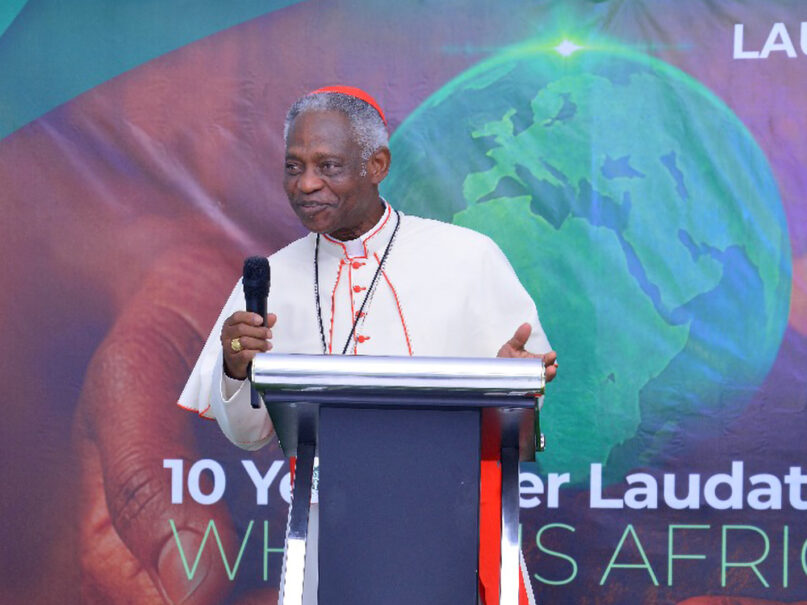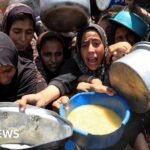(RNS) — Meeting near the Ugandan capital of Kampala, Catholic environmentalists in Africa marked the 10th anniversary this week (July 23-25) of the publication of Laudato Si’, Pope Francis’ encyclical on care of the environment, with a conference that asked how Africa has responded to the pontiff’s call for action.
Vatican officials and Catholic climate thinkers from the United States and around Africa joined other environmental activists, researchers and policy makers at Bethany Land Institute, a nonprofit ecological education center north of Kampala, for the three-day program.
Organized by the institute with the University of Notre Dame and Taproot Earth, a pro-democracy nonprofit based in Louisiana, the conference, titled “Laudato Si’: Where Is Africa?,” also honored the legacy of the late pontiff, who made climate and ecology one of the main concerns of his papacy.
“Ten years ago, Pope Francis made a bold call to care for our common home,” said the Rev. Emmanuel Katongole, a Catholic priest and Notre Dame professor of theology and peace studies who co-founded the institute, in his opening remarks. “Across Africa, communities rose to the call, building hope from the soil and the spirit of science. Now in Uganda, we gather to reflect, to renew, and to ask, what next?”
Katongole said he had been inspired to found the institute by Francis and his encyclical to combat environmental degradation, food insecurity and poverty on the African continent. “He died as we were preparing for this conference,” said Katongole. “We want to honor his leadership and his legacy and thank him for providing us with that urgent call to care for our common home.”
The participants at the conference considered a wide range of topics, from environmental degradation to sustainable agriculture and food security and energy. Several presenters and panelists talked about how scientific and economic approaches to these concerns could be influenced by spiritual concepts raised in Laudato Si’.
Sister Damien Marie Savino, a visiting professor in Notre Dame’s department of civil and environmental engineering and Earth sciences, described “an ecology of hospitality” based on the teachings of St. Francis, the late pontiff’s namesake. Pointing out that “nature’s ecological efficiency is only 40%,” she urged engineers and economists, who seek to design systems with 90% efficiency, to instead “hear the language of creation.”
Augustine Bahemaku, a policy adviser with the Africa Europe Faith and Justice Network, presented the idea of “integral ecology,” Francis’ term for the view that all of nature is interrelated, in terms of “African traditional systems.” That tradition, said Bahemaku, sees in the world a descending order from gods to ancestors to humans and to the natural world, a “mystical relationship” that puts humans at its center but nonetheless “doesn’t give permission or leeway to use nature as they want.”
Bahemaku went on to identify parallels between Laudato Si’s emphasis on the common good, community and sustainability and African traditions such as the transmigration of souls and totems. Respecting the community, he said, could be as simple as the principle that, on encountering a tree full of mangoes, “you don’t beat every mango out of the tree. Leave some mangoes for the people after you.”
Cardinal Peter Kodwo Appiah Turkson, who heads the Vatican’s Pontifical Academy of Sciences, similarly noted in his keynote address that adopting a new awareness of the need to care for the earth entails conversion to new lifestyles. Humans must “change the way we do and then become a little bit more brotherly or a little bit more sisterly towards creation as Pope Francis would have us think and do.
“So to encourage us to do this change and all that is there, he is inviting us to ecological citizenship. Francis wants us to recognize that we are ecological citizens and, in a sense, ecological citizenship, to learn and to feel with the earth. So hearing the cry of the earth and the cry of the poor requires a sense of ecological citizenship,” he said.

Cardinal Peter Turkson addresses the Laudato Si’ Africa Conference 2025 near Kampala, Uganda. (Photo courtesy Bethany Land Institute)
Several speakers cautioned that a decade after the release of the encyclical, Africa remains both ecologically vulnerable and on the frontline of the climate crisis.
“Cyclones, droughts and other extreme weather events across the continent have ravaged communities and ecosystems. The international community is yet to get its house in order about a comprehensive and just plan of action to address the crisis we face,” Allen Ottaro, founder and executive director of the Catholic Youth Network for Environmental Sustainability, told the Catholic Church in Africa in an interview.
Steven Kezamutima, African programs coordinator for the Laudato Si Movement in Nairobi, said the conference demonstrated, however, the importance of Francis’ encyclical in inspiring churches, and especially Catholics, to take action on climate change and its fallout.
“In different parts of Africa, preaching moved to action. Where there was a lack of civic space for climate activism or advocacy, Laudato Si’ has been the best tool,” he said. “Climate issues were in the Catholic social teachings, but for the first time, the church opened the door for climate conversation.”



